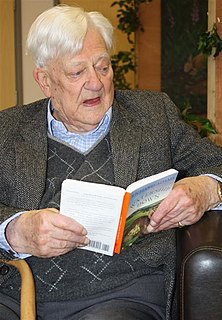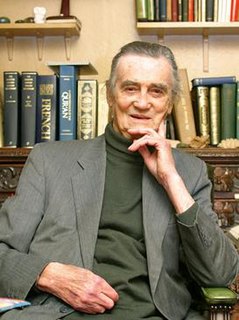A Quote by Cormac McCarthy
A man seeks his own destiny and no other, said the judge. Wil or nill. Any man who could discover his own fate and elect therefore some opposite course could only come at last to that selfsame reckoning at the same appointed time, for each man's destiny is as large as the world he inhabits and contains within it all opposites as well. The desert upon which so many have been broken is vast and calls for largeness of heart but it is also ultimately empty. It is hard, it is barren. Its very nature is stone.
Quote Topics
Related Quotes
Tragedy dramatizes human life as potentiality and fulfillment. Its virtual future, or Destiny, is therefore quite different from that created in comedy. Comic Destiny is Fortune - what the world will bring, and the man will take or miss, encounter or escape; tragic Destiny is what the man brings, and the world will demand of him. That is his Fate.
Each man had only one genuine vocation - to find the way to himself....His task was to discover his own destiny - not an arbitrary one - and to live it out wholly and resolutely within himself. Everything else was only a would-be existence, an attempt at evasion, a flight back to the ideals of the masses, conformity and fear of one's own inwardness.
Destiny ... a word which means more than we can find any definitions for. It is a word which can have no meaning in a mechanical universe: if that which is wound up must run down, what destiny is there in that? Destiny is not necessitarianism, and it is not caprice: it is something essentially meaningful. Each man has his destiny, though some men are undoubtedly "men of destiny" in a sense in which most men are not.
When the man was disgraced and told to go away, he was allowed to ask all the animals whether any of them would come with him and share his fortunes and his life. There were only two who agreed to come entirely of their own accord, and they were the dog and the cat. And ever since then, those two have been jealous of each other, and each is for ever trying to make man choose which one he likes best. Every man prefers one or the other.
Just because a man is dressed in a clean white robe does not mean his heart and hands are clean. Any man who neglects his conscience is a dangerous animal. Never judge a man by his image. Images can be bought or produced by any Hollywood producer, marketing team or fleet of stylists. Even kids know how to wear amazing costumes for Halloween. Always judge a man by the coloring of his heart and only his heart. Truth can be found in his record of actions, not intentions.
In the absence of government each man learns to think, to act for himself, without counting on the support of an outside force which, however vigilant one supposes it to be, can never answer all social needs. Man, thus accustomed to seek his well-being only through his own efforts, raises himself in his own opinion as he does in the opinion of others; his soul becomes larger and stronger at the same time.
Certain mystical philosophers have personified Destiny, and from this point of view each man's personal destiny is his archetype or "other self"--his "angel"--with whom he must be reunited if he is to rise above his fragmentary identity as a worldling and become whole, as he is (and always has been) in the mind of God.
The man who has known pure joy, if only for a moment ... is the only man for whom affliction is something devastating. At the same time he is the only man who has not deserved the punishment. But, after all, for him it is no punishment; it is God holding his hand and pressing rather hard. For, if he remains constant, what he will discover buried deep under the sound of his own lamentations is the pearl of the silence of God.
The priest therefore saw what the anchorite could not. That God needs no witness. Neither to himself nor against. The truth is rather that if there were no God then there could be no witness for there could be no identity to the world but only each man's opinion of it. The priest saw that there is no man who is elect because there is no man who is not. To God every man is a heretic.
If a man is crossing the river and an empty boat collides with his skiff, even though he is a bad tempered man he will not become very angry. But if he sees a man in the other boat he will scream and shout and curse at the man to steer clear. If you can empty your own boat crossing the river of the world, no one will oppose you, no one will seek to harm you. Thus is the perfect man - his boat is empty.





































